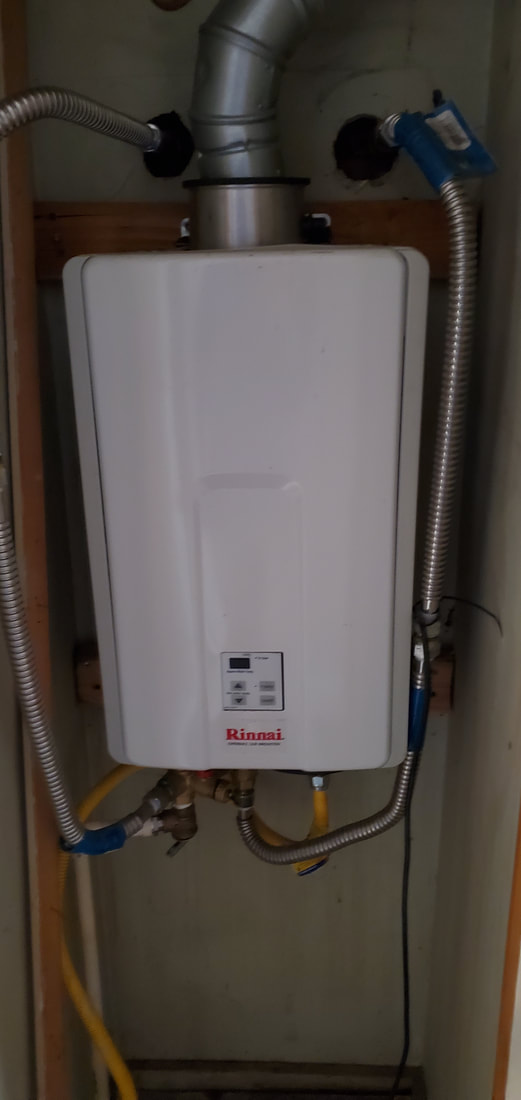|
Tankless water heaters, also known as demand-type water heaters, provide hot water only as it is needed. They don't produce the standby energy losses associated with storage water heaters, which can potentially save money.
Tankless water heaters heat water "on demand" without the use of a storage tank. When a hot water faucet is turned on, cold water flows through a heat exchanger in the unit, and either a natural gas burner or an electric element heats the water. As a result, tankless water heaters deliver a "constant" supply of hot water. You don't need to wait for a storage tank to fill up with enough hot water. However, a tankless water heater's output limits the flow rate. (This is important, as you should not expect endless amounts of hot water.) Typically, tankless water heaters provide hot water at a rate of 2–5 gallons (7.6–15.2 liters) per minute. Gas-fired tankless water heaters produce higher flow rates than electric ones, and don't require the high amp requirements of an electric unit. Sometimes, however, even the largest, gas-fired model cannot supply enough hot water for simultaneous, multiple uses in large households. For example, taking a shower and running the dishwasher at the same time can stretch a tankless water heater to its limit. To overcome this problem, you can install two or more tankless water heaters. You can also install separate tankless water heaters for appliances -- such as a clothes washer or dishwater -- that use a lot of hot water in your home. However, additional water heaters will cost more and may not be worth the additional cost. Per the US Dept of Energy: For homes that use 41 gallons or less of hot water daily, demand water heaters can be 24%–34% more energy efficient than conventional storage tank water heaters. They can be 8%–14% more energy efficient for homes that use a lot of hot water -- around 86 gallons per day. In some cases you may be able to achieve even greater energy savings if you install a demand water heater at each hot water outlet. Now, the initial cost of a tankless water heater is greater than that of a conventional storage water heater, but tankless water heaters will typically last longer per research, and have lower operating and energy costs, which could offset their higher purchase price. Most tankless water heaters have a life expectancy of more than 20 years, though they have not been around long enough to prove out this research in my opinion. They also have easily replaceable parts that may extend their life by many more years. In contrast, storage water heaters last 10–15 years nationally, and around 6-10 years in West Texas. Tankless water heaters avoid the standby heat losses associated with traditional tank water heaters. However, although gas-fired tankless water heaters tend to have higher flow rates than electric ones, they can waste energy if they have a pilot light. This can sometimes offset the elimination of standby energy losses when compared to a storage water heater. In a gas-fired storage water heater, the pilot light heats the water in the tank so the energy isn't wasted. The cost of operating a pilot light in a tankless water heater varies from model to model. Review the manufacturer's literature to determine how much gas the pilot light uses for the model you're considering. Look for models that have an intermittent ignition device (IID) instead of a standing pilot light. This device resembles the spark ignition device on some natural gas furnaces and kitchen ranges and ovens. Proper installation and maintenance of your demand water heater can optimize its energy efficiency. Proper installation depends on many factors. These factors include fuel type, climate, local building code requirements, and safety issues, especially concerning the combustion of gas-fired water heaters. Therefore, it's best to have a licensed, qualified plumbing and heating contractor install your demand water heater. Well, there you go! Everything you ever wanted to know about tankless water heaters!
2 Comments
1/16/2023 10:11:16 am
It really helped when you elaborated on tankless water heaters and how we'd optimize their energy efficiency. We're interested in investing in a new water heater this month, and we've heard wonders about tankless ones, so we'll definitely look more into them. Thank you for the tips on properly installing a tankless water heater to help us save on energy bills in the long haul.
Reply
3/5/2023 10:14:50 pm
Great Article! Thank you for sharing this is very informative post, and looking forward to the latest one.
Reply
Your comment will be posted after it is approved.
Leave a Reply. |
AuthorCale Cameron Archives
May 2024
Categories |
Proudly powered by Weebly


 RSS Feed
RSS Feed